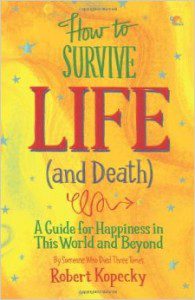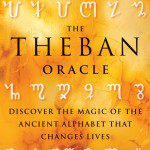 When I first read the title How to Survive Life (and Death): A Guide for Happiness in This World and Beyond by Someone Who Died Three Times, I thought, “This is going to be a kooky and sensational book.” The premise, as it turns out, was quite down to earth for a book about near death experiences.
When I first read the title How to Survive Life (and Death): A Guide for Happiness in This World and Beyond by Someone Who Died Three Times, I thought, “This is going to be a kooky and sensational book.” The premise, as it turns out, was quite down to earth for a book about near death experiences.
In the book, Robert Kopecky claims to have had three near death experiences that taught him how to enjoy life and accept death. The tools he learned, such as the power of kindness, forgiveness and acceptance, he shares with the reader as a means of not only striving in life, but as a path to a happy and easier death.
I had started the book hoping for wild descriptions of near death experiences and the afterlife, because I am a drama addict. However, what I received from reading the book was perhaps more profound. What I found was a simple guide for becoming grateful for one’s life and fearless about one’s inevitable death.
In general, the book was an easy read for anyone looking to begin their quest for answers about dying. The simplicity of writing had both its positive and negative sides. I appreciated that Kopecky gave the reader projects that can be started right away and used every day. Throughout, he was clear that death could be around the corner and that we should start living our lives with that in mind. It was helpful and empowering that he started his lessons with easy suggestions such as “being kind and doing kind things for others will reduce the physical pain you experience” (91).
The one drawback was the oversimplification of the Buddhist themes that ran throughout the book. It is too common in the New Age and self-help world to water down Eastern philosophies in order to make them accessible to Westerners. For instance, karma is not “What goes around comes around” (50) as Kopecky first describes it. Eventually, he more skillfully writes about karma in terms of action, cause and effect. Yet, any reader new to the idea would likely be left with the common misunderstanding that karma is a reward and punishment game.
With that said, I did appreciate that Kopecky did not focus too much on lofty religious ideas. Instead, he proposed that the key to life and death is how we love and treat those who we are in relationship with.
Notice, when we’re “coming to the end” of our time in this life with someone we love or for ourselves, just how precious and how special the remaining time suddenly is. How intensely focused our love and appreciation for each other becomes in those few moments that are left. We need to try to treat each other that way all the time, and grow spirituality together in that kind of Love. We need to recognize the eternal in each other, always. That’s what’s really important here; everything else is a distant second place. These may be lofty ideals, granted; but pursuing this, throughout our lives is time well spent, and leads to a sense of fulfillment that can never be matched in any other way. (101)
When I let Kopecky’s words really sink in, I felt blessed for all that love I had in my life. Sure, I had heartbreaks in the past and probably will have some coming in the future. But, when I focus on my present relationships, I know I am lucky. With that knowledge, I was driven to show everyone the love, kindness and forgiveness that Kopecky suggests throughout the book.
The other big gifts of the book were the skills offered to face and tackle the fears of death. Kopecky writes that “Life is always good, as long as we eat and sleep and are together, with the sun on our faces and a little cuddling. Changes come and go and rarely require a great deal of effort. There’s seldom a real need for fear” (75). While I would argue that there is plenty to fear in life (racism, sexism, war, etc.), when you can focus on being good to those in your life, then the regrets and fears seems to fade away. In fact, Kopecky suggests that if we focus on Love, both grieving and dying can be manageable. He writes about contemplation and meditation that:
You can find that all souls you have loved, who have loved you and have meant something in your life, can all be with you there, looking over your shoulder. Ever -present in your life. Speaking softly into your inner ear…
You can hear them in your mind when you’re not thinking, and feel them in your heart when you’re open in that way. And they will all love you anyway, whether you believe they’re only in your imagination or not. (120)
In the end, the book had a few oversimplifications and was not as sensational as I had hoped. Yet, I would recommend it to anyone who is interested in facing the fear of death and improving their view of life and the afterlife. Personally, I finished the book feeling both satisfied with my own life and encouraged that death can be experienced with grace and wisdom.
 Cecily Joy Willowe, M.Div. is an eclectic Unitarian Universalist Wiccan currently living in Colorado. After completing her Master of Divinity degree from Naropa University, she went on to work at local shelters as a homeless outreach manager and victim advocate. She is passionate about African Diasporic spirituality, interfaith work and social justice. More of Cecily’s writing can be found at Daughters of Eve.
Cecily Joy Willowe, M.Div. is an eclectic Unitarian Universalist Wiccan currently living in Colorado. After completing her Master of Divinity degree from Naropa University, she went on to work at local shelters as a homeless outreach manager and victim advocate. She is passionate about African Diasporic spirituality, interfaith work and social justice. More of Cecily’s writing can be found at Daughters of Eve.













